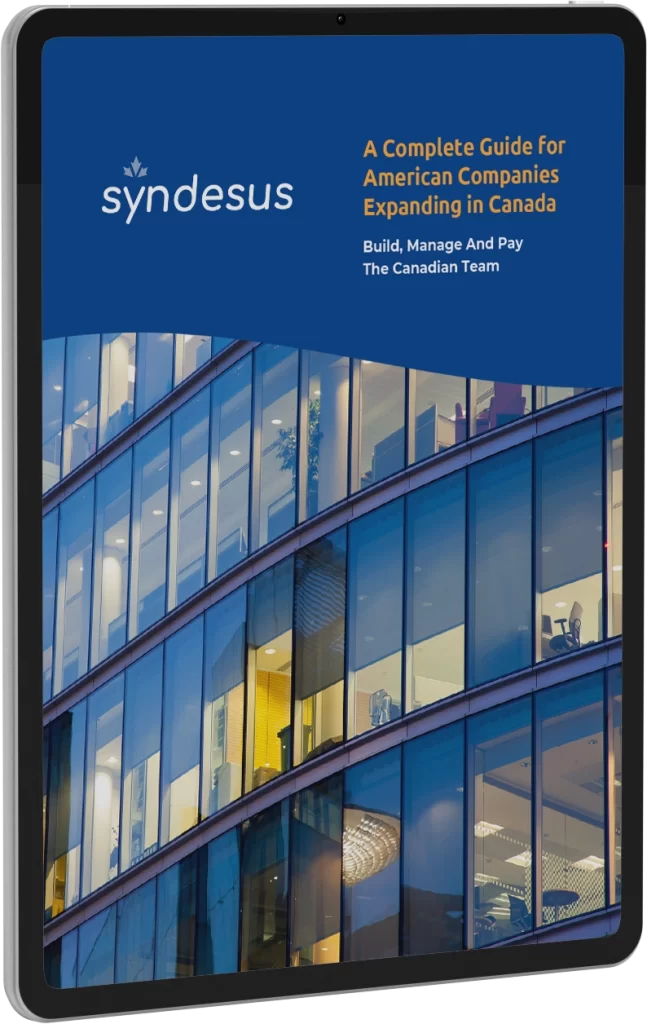For Canadians living in the U.S., the challenges of navigating immigration and border policies have led many to consider returning to Canada, even if just temporarily. Whether it’s to reconnect with family, friends, or simply to take a break from life in the U.S., the decision to return comes with important considerations, especially regarding U.S. immigration laws.
With the U.S. election season upon us, the landscape of immigration policies could shift, making it crucial for Canadians in the U.S. to stay informed. This article will explore two major scenarios: Canadians living in the U.S. under a temporary work visa and those with a green card, and what they should keep in mind if they plan to head back to Canada for a while.
At Syndesus, we’ve assisted numerous Canadians in returning home to work remotely while remaining employed by their U.S. employers. As a Canadian Employer of Record (EOR), we facilitate this process, ensuring that individuals can be close to loved ones while continuing their work seamlessly.
However, for many, this move is temporary, with plans to return to the U.S. within the next 3-6 months. This raises important U.S. immigration questions, which we’ve addressed with the help of U.S. immigration attorney Sameer Khedekar, founder and managing attorney at Banyal Immigration, a San Francisco-based firm known for blending legal expertise with innovative tech solutions.
Before diving into the specifics, please note that the information provided here is general and not intended as legal advice. For personalized legal guidance, it’s recommended to consult an immigration lawyer.
Canadians on Temporary U.S. Visas Returning to Canada
Thousands of Canadians currently live and work in the U.S. on temporary work visas, such as H-1B, TN, and L-1. If you’re in this category and are considering a temporary return to Canada, there are several U.S. immigration considerations to keep in mind.
Sameer Khedekar advises that the most critical step is to track the time spent outside the U.S. “Employees on temporary visas like H-1B and L-1 should meticulously document their time in Canada, as this can be ‘recaptured’ and added to the duration of their visa,” he explains.
This can be tricky, especially for land crossings where passport stamps might not be issued. Sameer suggests requesting a passport stamp to confirm both your departure and re-entry into the U.S. He also recommends checking the CBP I-94/travel history database to ensure all trips are recorded accurately.
When it comes to re-entering the U.S. on a temporary work visa, Sameer advises carrying a letter from your employer explaining your temporary departure and confirming that your job remains available. “While most border officers won’t require this, it’s a good precaution,” he notes.
For those working remotely from Canada through an EOR, this letter can be particularly helpful if you encounter an officer unfamiliar with EORs or remote work arrangements.
Sameer also reassures that working in Canada through an EOR does not affect your U.S. work visa. “U.S. immigration law focuses on your employment situation upon re-entry, not during your time outside the U.S.,” he explains.
Canadians with U.S. Green Cards
For Canadian Legal Permanent Residents (LPRs) in the U.S., travel outside the country comes with its own set of restrictions. LPRs must demonstrate their intent to maintain U.S. residency, particularly when planning extended trips abroad.
“If you leave the U.S. for an extended period, you’ll need to prove to an immigration officer that you’ve maintained your U.S. residency,” Sameer says. This is crucial for those aiming to eventually obtain U.S. citizenship.
Trips under six months usually do not raise concerns, but for longer absences or multiple extended trips, Sameer advises applying for a reentry permit to protect your U.S. residency. Maintaining ties to the U.S., such as homeownership, bank accounts, loans, and tax filings, is also essential.
If you plan to work remotely from Canada, it’s vital to consider how this might be perceived in terms of your residency status. “Green card holders should obtain a reentry permit if they are employed abroad, as this can be seen as evidence of foreign residency,” Sameer warns.
Syndesus: Helping Canadians Work Remotely from Home While Staying Employed in the U.S.
At the end of the day, being close to family and friends is invaluable. Syndesus has successfully helped Canadians return home while maintaining their U.S. employment.
For tech companies and other industries where remote work is feasible, working from home in Canada with the help of an EOR is seamless and effective. Syndesus handles all the cross-border logistics, ensuring that you can focus on what matters most: your loved ones and your work.
If you’re considering a temporary move back to Canada, Syndesus is here to assist. Book a free consultation to explore how we can help you maintain your U.S. employment while being close to those who matter most.
Syndesus can help you be back home in Canada while working remotely for your US employer
At the end of the day, the most important things are good health, family and friends. While being “stuck” at home with family has its challenges, quarantine has also brought families closer. But just the same, working and living in a different country from your family, friends, and loved ones during quarantine can make it that much harder.
Syndesus has helped Canadians go back home, even if just for a few months while maintaining their US employment.
Especially for tech companies and other tech-enabled industries, working from home in Canada, with the help of an EOR, feels no different from working at home in the US Syndesus handles all the cross-border technicalities while you get to be with your loved ones and your company gets a happier and more productive employee.
If you want to learn more about how Syndesus can help you get back home while staying employed, book a free consultation to discuss your situation.

